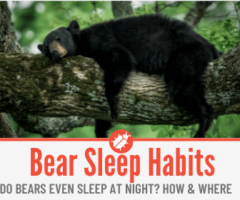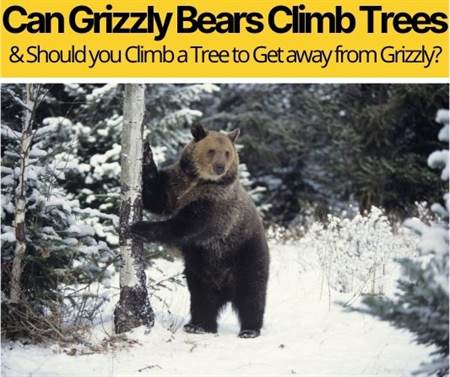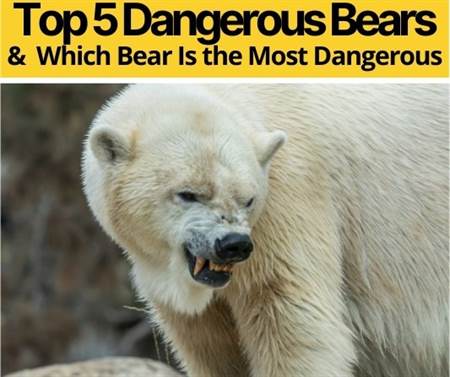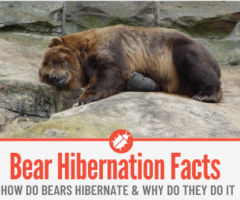 Meeting a bear in the wild or by chance in your neighborhood (can that really happen?), is not something you are likely to forget.
Meeting a bear in the wild or by chance in your neighborhood (can that really happen?), is not something you are likely to forget.
In the past, bear hunting was a common sport – not so much anymore as there are now laws restricting bear hunting in many states.
You may not want to hunt a bear. Maybe you are planning a hike or a camping trip in bear country or you’re just curious if you can come across one while you are out at night?
Do Bears Come Out at Night?
Bears Do come out at night, however, they are most active from dawn to dusk. If you are camping and leave easily accessible food – This might attract a wild bear to your tent at night when its quieter and the bear thinks there is no one around.
Bears in general, are not nocturnal; their sleeping behavior is mostly driven by seasonal changes and how they can easily get food. Bear diet is mostly vegetarian, they feed on fruits, berries, roots, and leaves. but they will occasionally eat fish and smaller animals like the deer or the elk.
They also find human food/waste (the stuff you dump in the trash can), and even pet food yummy! So, they visit! If a bear can easily get food close to you, he is likely to hang around and visit when he wants to eat. That can lead to particularly nasty encounters – especially if they visit at night.
With every repeat visit – that the bear finds food – he will grow bolder, and because bears are typically social animals, he might get his friends to come over to the “party”.
You don’t want that – not just for yourself, the bears might venture into the property of other people. In most places, it is against the law to intentionally try to attract bears by feeding them.
To put it simply, bears will always try to avoid people – except when they can easily find food around them. And if they get food by hanging around where people live, they will likely visit at night – or when the place looks deserted. They do this to reduce the chance of human contact.
When bears start coming around, the best way to get rid of them and reduce the chance of an unpleasant encounter is to remove whatever attracts them in the first place. Food is usually, the culprit.

Why Bears Come out At night & What do they Do at Night?
If they’re not sleeping, they mostly forage for food. During the cold winter months, most bears will spend a great deal of time in very deep sleep (See: All You Need to Know About How Bears Sleep and Hibernate at the end of the article). So, whenever they are active, it is usually to eat.
The primary activity bears carry out during the day or at night is looking for food. Like I said earlier, they will visit your yard, if there is anything worth eating, which there generally is, think about fruit trees, pet food, and of course, your garbage. Bears seem to discover all sorts of delicacies in the trash can.
Continue Reading: Do Bears Sleep at Night
What Time Do Bears Come Out at Night
Bears do not have a specific time when they come out at night like some animals. They are mostly active in the early hours of the day (just before daylight) and a little before total nightfall. The deciding factor is when the bear can get food. Once the bear is not hibernating, they are almost always active day or night.
Bears have a good sense of smell, so if, for example, you are camping out in bear territory and a bear smells your cooking, he will likely come around to see for himself. And that could be at night.
To avoid a surprise visit by a bear, you should clean up immediately after any meal and store your food away from your tent and where the bear cannot easily reach it.
Also Read: The Most Dangerous Bears
Do Brown Bears Come Out at Night
Brown bears are active at night if there is food to be had. To prepare for the long winter months when food supply is not so plentiful, they will spend the better part of their time feeding during the day and at night. They may take short naps in between food trips and eating, while waiting out bad weather or when the weather is too warm.
How brown bears behave depends a lot on where they live. Bears that live in places where the food supply is plentiful may not even hibernate as there is no real need to.
These types of brown bears mostly live in warmer regions. They are also smaller in size compared to the bears who live in colder regions where food is not as plentiful.
Do Black Bears Come Out at Night
Black bears do come out at night. But it’s not because they are uniquely nocturnal. Like brown bears, they will come out at night to forage for food. And like brown bears, the behavior of black bears depend on where they live and how easy it is to find food.
Do Polar Bears Come Out at Night
Polar bears can be active at night, especially if they are hunting (or waiting near the breathing holes of ringed seals –their favourite prey). Polar bears spend an average of around 7 hours sleeping – roughly equal to humans and they may sometimes sleep more at night.
Because polar bears live in very cold regions where daylight is often limited for many months, the time of the day isn’t as important to polar bears since they must adapt to hunting in the brighter summer months and the long and bleak winter months of the arctic. More info on Polar Bears and when they are most active.
Do Grizzlies Come Out at Night
Grizzlies are a sub-species of brown bears. Like all their cousin brown bears which include the Kodiak bear and the Alaskan Peninsula brown bear, grizzly bears will come out at night if there is food to be had.
Do Sun Bears Come Out at Night
Sun bears are a unique species of bear found mainly in the South-eastern Asian countries of Malaysia, Borneo, Vietnam, and India. Sun bears prefer foraging for food in the dark and they will definitely come out at night. In the wild, they scour the forests looking for insects, berries, and small animals like lizards and rodents mostly at night.
When Are Bears Most Active
It really depends on the type of bear. Black and brown bears are usually most active early in the morning, at dawn, and just before total nightfall. Most sightings of bears, especially the more abundant brown and black species are usually made just before sunrise and in the evening.
This behavior is more noticeable during the spring and summer months as the bears prepare for their long winter hibernation.
Do Bears Attack at Night
Though bear attacks are rare ,some bears are predatory and will often stalk a person until they can attack. If a predatory bear can attack, it will attack whether it is day or night.
That said, you are at the most risk of being attacked by a bear at night if you are hiking or camping out. Night-time isn’t really the best time to go for a walk along the trail (if you are hiking). Chances are that you might surprise a bear, or stumble in between a bear and his prey.
A bear will not usually wait for nightfall before attacking if it intends to. Bears can attack in the night as well as in the day, perhaps even more since their prey may be affected by the lack of good visibility at night.
How Good Can a Bear See During the Night?
Bears can see very well at night. Like cats and dogs, bears have a reflective layer behind their retinas that “bounce” light back at the light-sensitive cells. Because of this, their eyes have a greenish color at night.
Are Bears Nocturnal or are they Diurnal?
Most species of bears are diurnal and are active throughout the day. However, bears can develop nocturnal behavior just to avoid people – and especially if they can get food that way.
Black Bears
Black bears are the most common bear species in the world! This means that they have more frequent contact with human beings and can easily associate places where humans live as easy food sources.
To scavenge for the remains of human food and still avoid people, black bears will develop nocturnal behaviour. Bears have good eyesight in the dark, this makes night-time perfect for rummaging around your yard for leftovers.
Where the black bear lives play an important role in determining its sleep habits. If it is living further away from people, it will be more active during the day and vice-versa.
Brown Bears
Brown bears like grizzlies tend to live farther away from human beings. As a result, they are usually more active during the day – as it is the best time to look for food.
That can change too, if the grizzly bear is disturbed by a continuing human interference, it will switch its sleep habits and develop nocturnal behaviour.
Polar Bears
Polar bears are not nocturnal. Frankly, because of the harsh weather conditions in polar bear land (cold, windy, and dark for months), polar bears do not care about the time of the day when they sleep.
They can be more active at any time of the day depending on when they have the best chance of having a meal.
Koala Bears
While Koalas are not really bears, koalas are nocturnal. They are mostly active during the night and spend much of their day asleep. Koalas are night-loving marsupials – which means they are more closely related to kangaroos than to bears.
Sun Bears
Despite their names, Sun bears are nocturnal animals. They are called sun bears because of the orange-colored horseshoe patch on their chests.
Sun bears are also known as honey bears because of their love for the sweet liquid. They are the smallest type of bears still existing.
Panda Bears
Pandas are active during the day and during the night. They spend a huge chunk of their wake-time eating bamboo. Instead of being classed as simply diurnal or nocturnal, pandas are “crepuscular” which means that they are mostly active at dawn and just before nightfall.
All You Need to Know About How Bears Sleep and Hibernate.
In summer, bears tend to be a bit more relaxed. While they will still hunt, pick berries, and dig roots to eat, they also tend to rest a little bit more.
After a particularly good meal, the bear will look for somewhere good enough to nap and rest as he digests his meal. However, as temperatures start dropping towards autumn, the bear begins to be a little bit more desperate or aggressive when looking for food.
This is because it needs to build up fat for the long winter months ahead. What happens during winter?
As the cold begins to build, the bear will seek out a protected place, a den. Then it lays down and begins a deep sleep that will last for several months. It hibernates.
During this period, the body temperature of the bear will drop a little. But its heartbeat and breathing will slow down considerably to conserve energy.
Some organs like the kidney will shut down. Hibernation can last as long as 5 months. Some species do not really hibernate though, like the sun bear and the polar bear. Even those that do hibernate, like the black bear, will not do so, if the food supply is plentiful.
Read our Full Guide on bear Hibernation: Why Do Bears Hibernate
Related Questions
Do Bears Give Birth While Hibernating
Yes! In fact, hibernation is the best time for sows (female bears) to give birth. Here’s how that happens.
Bears mate around May through July. However, the fertilized eggs are not implanted immediately. Instead, it is suspended until close to the beginning of the denning season (which is when they begin to prepare to hibernate).
At this stage, the female bear has to eat large amounts of food to store enough fat. If it doesn’t attain sufficient weight, the embryos will not develop into bear cubs. If she eats enough food, the embryos will implant on the uterine wall and she will eventually give birth to baby bears. She has to wake up though from hibernation to do this.
Do Hibernating Bears Poop
Bears do not poop or even urinate when they are hibernating. However, hibernating bears can wake up intermittently if they sense a disturbance. If the disturbance continues for some time, the bear may not go back to sleep.
Although bears may lose up to 33% of their body weight while hibernating, they wake up physically fit with no significant reduction in their bone density or muscle mass and are ready to start hunting at once. Of course, they are also very hungry






